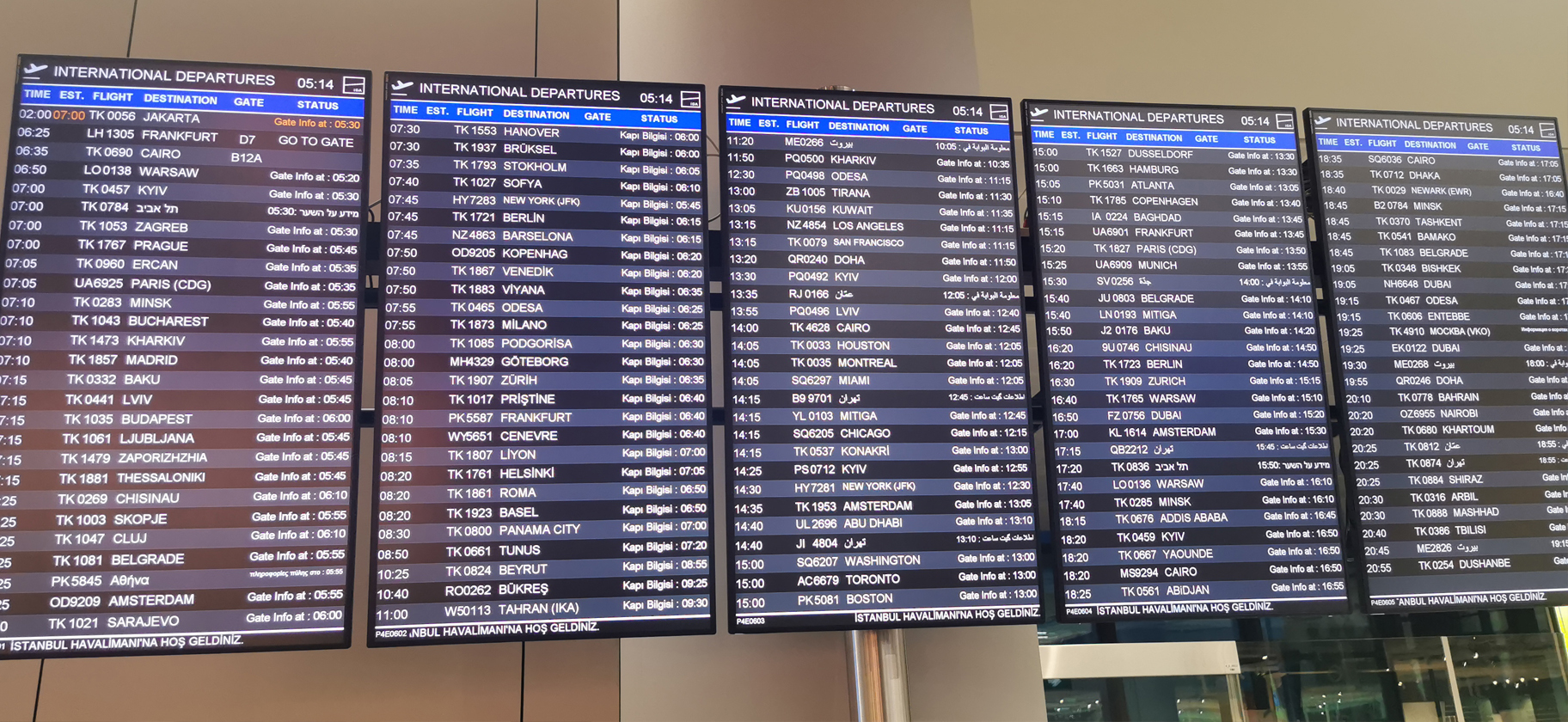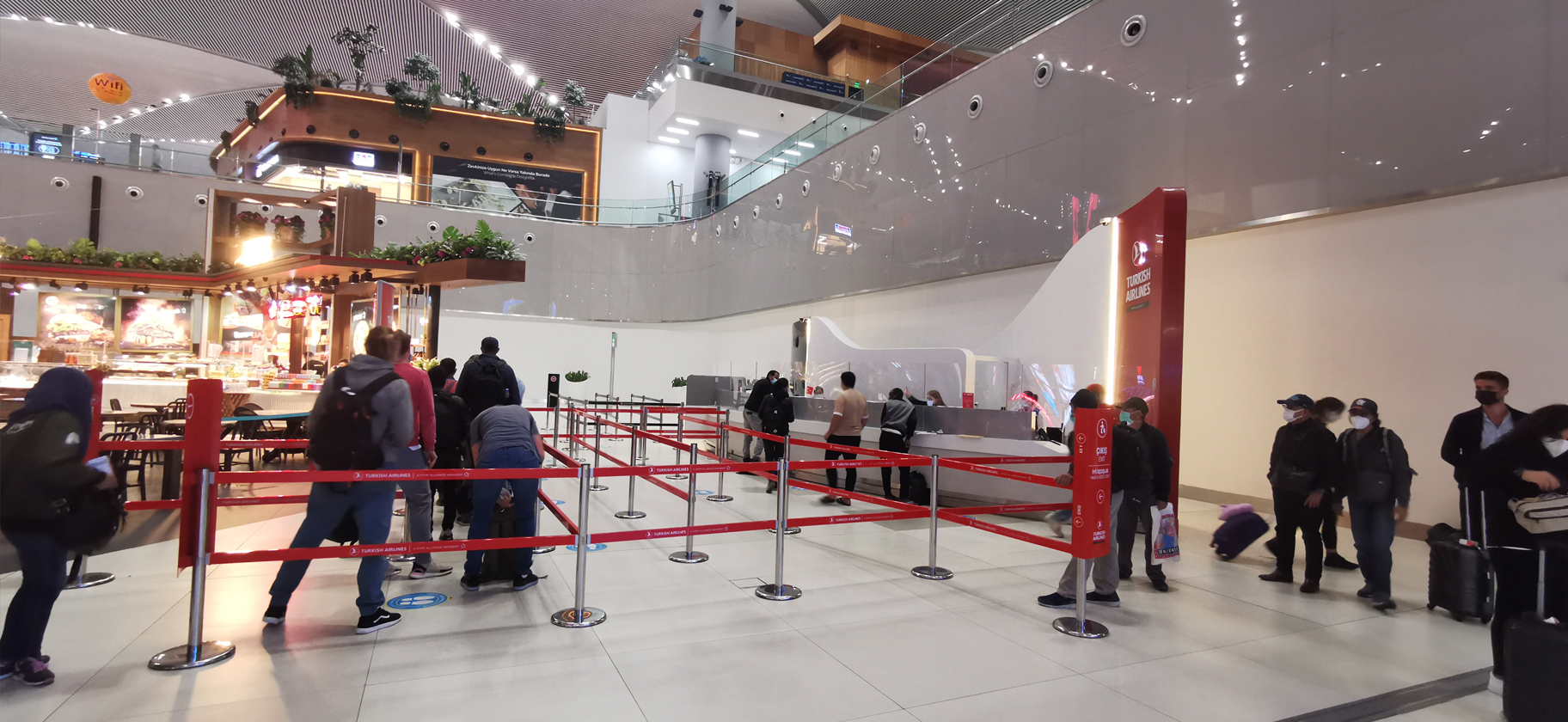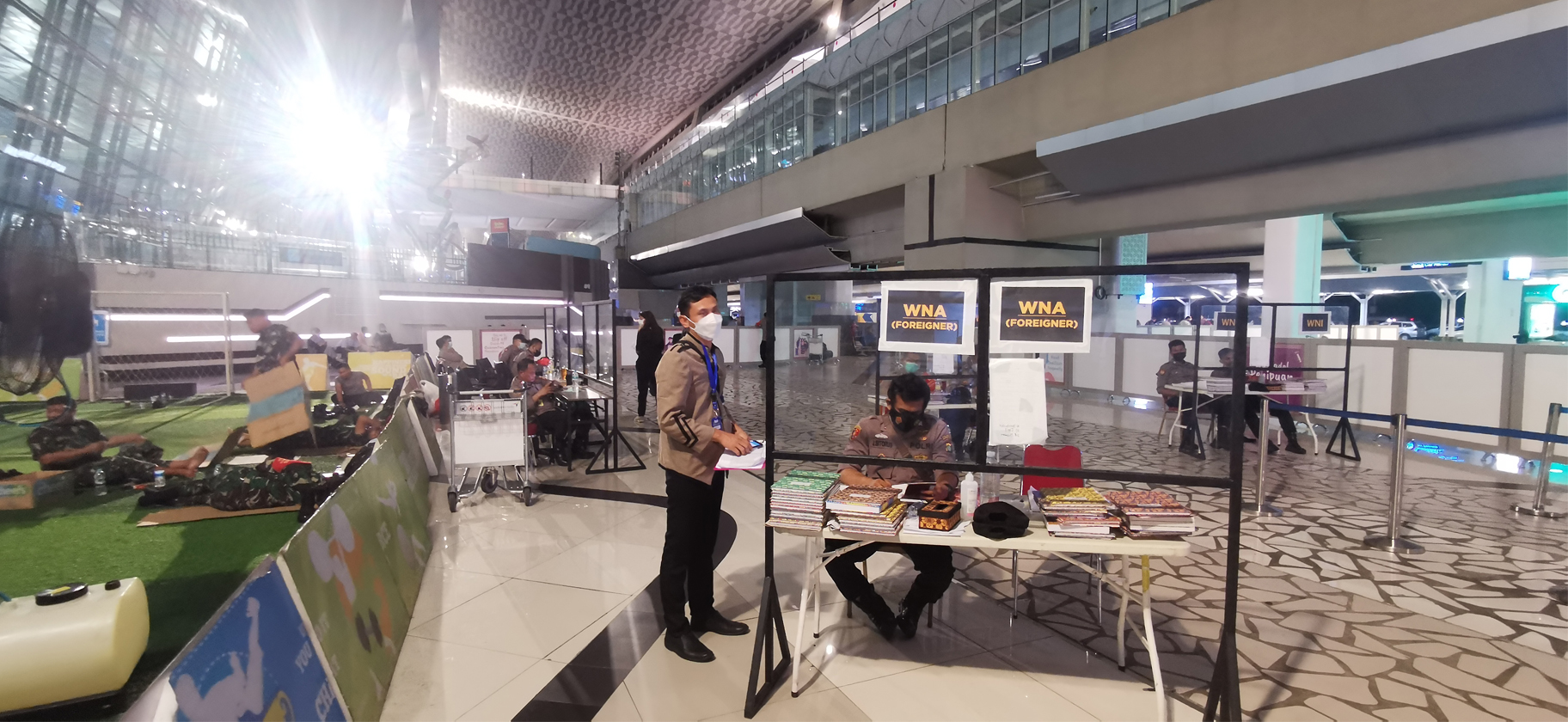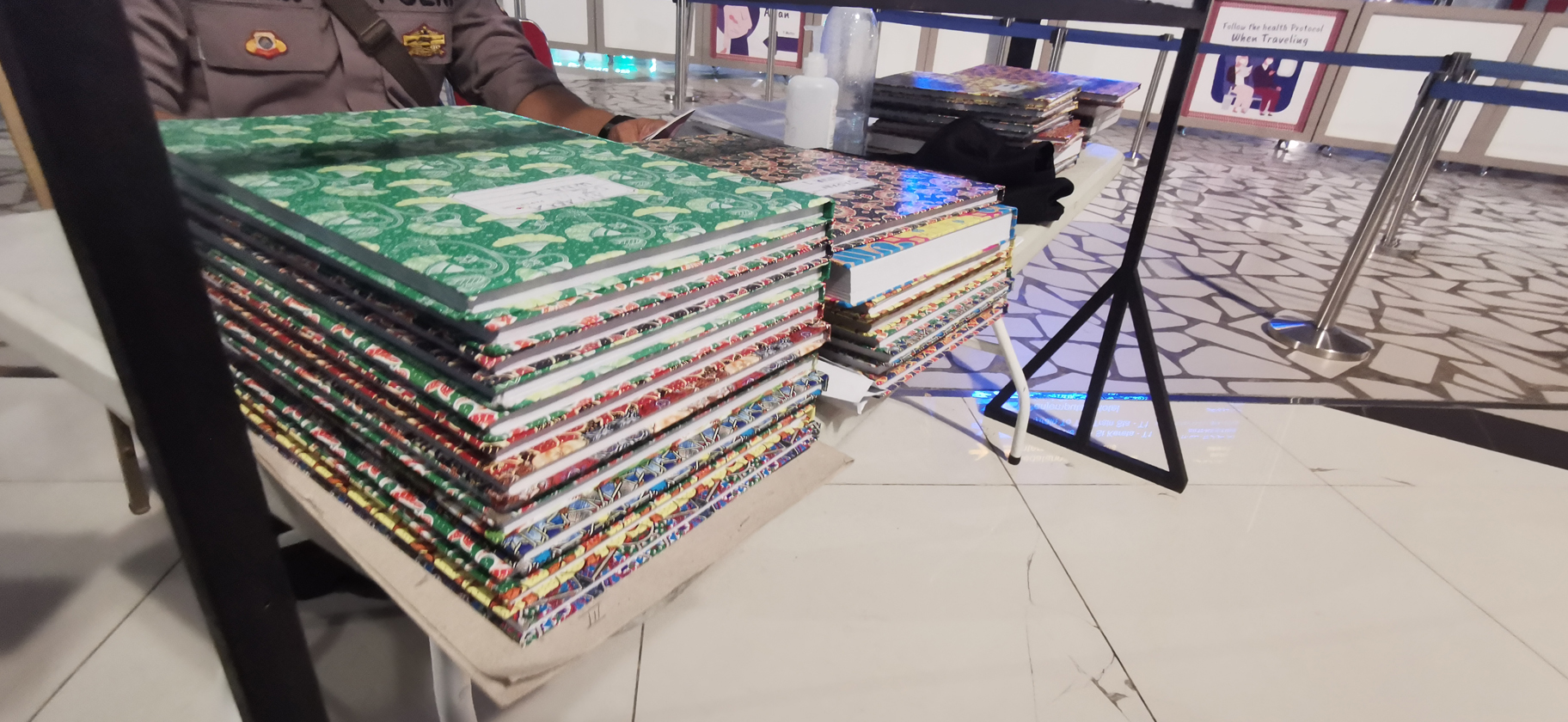The Airport

With all of the new travel regulations in place, I was taking no chances. I wanted to give myself ample amounts of time in case I ran into any roadblocks or covid-related red tape. I had no other pressing matters for the day and my sole objective was to get my boarding pass and get to Jakarta.
In the spring of 2019, international flights to and from Turkey were permanently rerouted from Atatürk to the recently opened Istanbul International Airport. Istanbul-area airports were already some of the busiest in the world servicing over 100 million passengers travelling between the Americas, Europe, and the Middle and the Far East, but by 2010 their proximity to Istanbul’s city-centre meant that they were reaching capacity and a new and larger international airport, capable of handling even more travellers, would have to be built. Since my flight from Canada to Europe nine months earlier, I had visited a half-dozen airports. Before the pandemic, even the smallest among them was a frantic place with lanes and passageways bulging at the seams and people shuttling off in one direction or another at every hour of the day. In the pandemic era, airports had turned into creepy, vast, empty halls. For months, airlines had been running on razor-thin budgets and several common travel corridors had been suspended. In order to streamline departure and arrival processes, many airports had shut down major sections of their operations. Often, only a single hall would be illuminated by electricity and flow reduced to a single entrance and exit. Shops and cafés were closed indefinitely and staff trimmed to only the most essential. In order to monitor the movement of passengers, Istanbul International’s departure terminal had opened only 1 of its 7 entrances.  Signs promoting covid awareness urged passengers to maintain social distancing protocols while thousands lined up single file and funnelled through the only open door. Security stood at the entrance requiring proof of an upcoming flight and police patrolled the outside of the airport ensuring people were wearing masks and enforcing covid protocols while violating the protocols themselves.
Signs promoting covid awareness urged passengers to maintain social distancing protocols while thousands lined up single file and funnelled through the only open door. Security stood at the entrance requiring proof of an upcoming flight and police patrolled the outside of the airport ensuring people were wearing masks and enforcing covid protocols while violating the protocols themselves.
Entering the terminal, I was transported to an earlier time. There were long lines at check-in counters, families loitering together among a forest of luggage and cardboard boxes, queues at coffee shops, and trolleys and golf carts whizzing between check-in counters as I had not seen since the start of the pandemic. Passengers spilled over and beyond the barriers leading them through immigration and security and the corridors leading to every gate were aglow in the light of every boutique and book shop operating as though it was business as usual.
Despite Istanbul International being the busiest airport I had visited in the last year, it retained an uncanny orderliness. Paperless boarding passes had once made check-in counters no more than oversized baggage depots, but in the pandemic era, they had become a pre-flight requirement. Airline admins, given explicit instructions, mulled over and double-checked authorizations and certifications but travellers seemed more prepared and aware of compliance procedures than ever before. Moving between the stages from check-in to security and immigration was swift and systematic.
Staring up at the big board and it was obvious that Istanbul Airport was unlike other airports. In the covid-era, many countries and their largest airports had reduced international routes to just a few key travel corridors. Even if a route was available, I had become conditioned to notice the red warnings that read: Cancelled. But Istanbul was a geography lesson. There could be as many as twenty international flights leaving every hour to destinations such as London, Amsterdam, Paris, Prague, Moscow, Dubai, Vilnius, Riyad, Rome, Vienna, Amman, Kinshasa, Tehran, Warsaw, Minsk, New York, Makhachkala, Casablanca, Budapest, Zanzibar, Ljubljana, Addis Ababa, Cairo, Zagreb, Kyiv, Douala, Belgrade, Dhaka, Tashkent, Muscat, Misrata, Sarajevo, Athens, Bishkek, Bucharest, Kigali, Sofia, Abu Dhabi, Skopje, Beirut, Khartoum, Jeddah, Baghdad, Kuwait, St. Petersburg, Tbilisi, Doha, Tel-Aviv, Seoul, Ouagadougou, Alexandria, Bahrain, Lagos, Kathmandu, Accra, Kuala Lumpur, Tokyo, Johannesburg, Cape Town, Seychelles, Baku, Caracas, Singapore, Manila, Aktau, Mexico City, Mogadishu, Tunis, Frankfurt, Chicago, Madrid, Dublin, Lisbon, Munich, Chisinau, Edinburgh, Stockholm, Oslo, Berlin, Barcelona, Malta, Brussels, Zurich, Copenhagen, Helsinki, Los Angeles, Tallinn, Luxembourg, Bogota, Ulaanbaatar, Nouakchott, Tirana, Miami, Toronto, Entebbe, Nairobi, Dushanbe, Conakry, Bamako, Venice, Dusseldorf, and, of course, Jakarta. Every destination was listed as “on time” and was continuously updating upcoming its gate information. It was a sight to behold at any time let alone in the midst of a worldwide pandemic that had grounded thousands of flights.
A section of Istanbul International’s arrival hall had been cordoned off for passengers to arrange and undergo a buffet of covid tests including PCR, antibody, and antigen tests with results available in just a few hours. Having arrived and obtained my negative covid test by the early afternoon, I had lots of time to kill until my 2 am takeoff.  I walked from one end of the terminal to the other people watching and browsing through the shops. There were numerous flights leaving that day headed to mainland China and travellers flying in that direction were the easiest to spot.
I walked from one end of the terminal to the other people watching and browsing through the shops. There were numerous flights leaving that day headed to mainland China and travellers flying in that direction were the easiest to spot.
I had dropped off my rucksack at a Turkish Airlines early check-in counter and suddenly realized that all of my toiletries, including storage and solution for my contact lenses, were inside. Among all of those shops in the departure terminal, there was not a single pharmacy. I inquired at the information kiosk and was told that there was a pharmacy only before security but that I could have a representative deliver a kit to me right to where I was standing. Problem solved and twenty minutes spent.
I installed myself at the airport lounge where I had a meal and got to work on a number of projects. Based on the information I had received from the lawyer in Indonesia, I needed to arrange accommodation from a list of the approved quarantine hotels. After researching the various options, I made a booking at a hotel in central Jakarta for 6 nights – I allotted 5 nights for their mandatory quarantine and 1 night just to make sure that everything would be above board. At the lounge, I was able to have a shower and, as the hours passed, I strove to put myself in the best position to be able to relax on the flight and sleep through the journey. It was finally happening.
By midnight, gate information for the flight to Jakarta came in and I left the lounge. The terminal was still bright as it had been during the day but it was far less busy and most of the shops were now closed. Lights blinked in the darkness out of the large bay windows overlooking the airfield as passengers of flight TK0056 stumbled into the waiting area. Over the loudspeakers, a voice called out reminding everyone to maintain social distancing and to wear a mask throughout the airport. There were reminders to passengers of various flights to head to their respective gates, notices for specific passengers to approach service counters and speak with airline staff, and warnings of the last call for flights that were set for takeoff.
The scheduled boarding time for the flight to Jakarta came and went with all of us waiting, ragged and tired, and on the verge of sleep. An attendant came from the counter to address an impatient passenger and back to inform pockets of travellers that there was a problem with the plane and that the flight would be significantly delayed.  The news went out that the plane would need to be replaced with another incoming jet and would not leave until the next morning. An agent came to collect all of the passengers and guided us to the care point on the other side of the airport where we were offered vouchers for a meal as compensation.
The news went out that the plane would need to be replaced with another incoming jet and would not leave until the next morning. An agent came to collect all of the passengers and guided us to the care point on the other side of the airport where we were offered vouchers for a meal as compensation.
There is not much on offer in the airport at 3 am and our choices were between Sbarro, Burger King, and Popeyes or, most likely to be the healthy alternative, a Turkish restaurant called Tadinda Anadolu which was mostly closed but for some staff cleaning counters and trays. Özge, a young Turkish artist on her way to work in a gallery in Bali, and I still seemed to have our wherewithal. Together we pleaded with staff to offer us and others at least something. We managed to wrangle some cooked chicken and rice but having made new friends in the process helped to pass the hours waiting for a new flight schedule. We walked from one end of the airport to the other hitting all of the gates along the way and checking out all of the temporary exhibitions that had been put on display. Our obsession was the big board that, for the first time that day, had a frustrating touch of colour. It tested the patience that, of all of the flights leaving that day, it had to be the one flight that I had been waiting for months to take.
By the time boarding began, the sun was rising and I had been awake for over 24 hours. I could barely stand and believed that sleep would instantly overtake me once we had taken off. My eyes caught the light of the blue sky and the sun over the horizon as I propped my head up by the window. My eyelids were heavy as flight attendants came through the lit cabin with our meals. When meal service was over the lights went out and I closed my eyes. It was meant to be an 11-hour flight and, with but barely an hour of it used up, I felt confident I was in store for a solid 8 hours of restful sleep.
I awoke with a stale taste in my mouth from my breath rebounding off of my mask while I slept. I felt groggy but awake. I figured that there could not be more than a couple of hours of flight time left to go and that they would be around with the last meal service soon. I opened the in-flight entertainment screen to check the data on the flight map. There was a full 7 hours still to go and I had slept less than 3 hours. Full to the brim with anxiety, I stared at the screen barely awake but unable to fall back asleep. I watched tv shows and documentaries that were neither captivating enough to keep my attention nor boring or repetitive enough to help me fall asleep. I knew there would be a time where I would be safe and cozy in a hotel room with no concerns but to sleep through until I felt refreshed but every minute seemed to pass so slowly that that moment of comfort teased like it would be forever out of reach.
It was an entire day spent in artificial air and artificial light. I felt like the edges of me were stretched and crackling like my skin and bones were made of chewed bubble gum. By the time we landed in Jakarta, it was almost midnight. I had already lost so much time in wakefulness and waiting and now there was the awkward mess of needing to explain myself to a series of government agents who would barely understand my words.
Deboarding the plane was done in an orderly fashion as the passengers were led into a large hall with socially distanced chairs, with a health declaration placed on top, for each one of us. The airport arrival hall was eerily quiet. Whether it was due to the pandemic situation or the late hour of arrival, it felt as though passengers of flight TK0056 were the only travellers in the whole of the airport. I immediately opened my phone and attempted to connect to the airport wifi. While filling out the health declaration, I noticed I had received a notification from the hotel in Jakarta. They explained that they were no longer listed as an official quarantine hotel and would be unable to accommodate me. When we had been given enough time to fill out the form, an official indicated to us to stand up and approach the health officials who sat behind a plexiglass window. They scanned our PCR-test certificates and stamped our health cards. I felt like I was dying but obviously I looked well enough to the health official to let me pass on to customs. I continued to search for viable hotel options on my phone but the wifi connection would not cooperate and I was eager just to get through the barrier at immigration. I presented my passport and my visa.
Where is your onward ticket, the agent asked.
I am here on a business visa and am staying in Indonesia indefinitely, I explained.
You need to have an onward ticket, the agent insisted.
I was never told I was going to need to have an onward ticket.
Well, I can’t let you through until you have one.
I stepped away from the queue and paced around the customs hall raising my phone into the air hoping to get a strong enough signal. I bought the cheapest ticket I could find – a $40 flight to Singapore that was 60 days away.
 After finally passing through customs, I was led out of the terminal where traffic got funnelled past a series of desks run by officials busy logging passenger information into a series of handwritten ledgers. There were stacks upon stacks of books piled on top of each other next to each desk while military personnel rested on the nearby sidewalks. Leveraging not a single iota of digital code, it looked like something out of the 1940s. Suddenly, I was in the foyer by the exit of the airport and I could see the lights of downtown Jakarta in the distance. There had been no opportunity to visit a shop and purchase a local SIM card. I still wasn’t connected and I had no place to stay. A government-appointed booking agent approached me and asked me if I had a reservation. Lines of taxis were out in front busy shuttling off passengers with pre-authorized accommodations. I felt lost and I could not find the words to explain my situation or even know if it could be solved. He offered me a suite in central Jakarta for five nights for 8.5 million rupiah. Even in my near-catatonic state, the price seemed absurd. The mere mention of the word million and associating it with a night’s stay crept into the realm of ridiculous.
After finally passing through customs, I was led out of the terminal where traffic got funnelled past a series of desks run by officials busy logging passenger information into a series of handwritten ledgers. There were stacks upon stacks of books piled on top of each other next to each desk while military personnel rested on the nearby sidewalks. Leveraging not a single iota of digital code, it looked like something out of the 1940s. Suddenly, I was in the foyer by the exit of the airport and I could see the lights of downtown Jakarta in the distance. There had been no opportunity to visit a shop and purchase a local SIM card. I still wasn’t connected and I had no place to stay. A government-appointed booking agent approached me and asked me if I had a reservation. Lines of taxis were out in front busy shuttling off passengers with pre-authorized accommodations. I felt lost and I could not find the words to explain my situation or even know if it could be solved. He offered me a suite in central Jakarta for five nights for 8.5 million rupiah. Even in my near-catatonic state, the price seemed absurd. The mere mention of the word million and associating it with a night’s stay crept into the realm of ridiculous.

In Indonesia, merely arranging a stay at a government-approved hotel was not enough. The details of your stay and its procedures, including even the price, were constrained by what the government was prepared to offer. A perfectly comfortable boutique hotel with state-of-the-art facilities in downtown Jakarta goes for as low as $30 per night. On offer to new arrivals were hotels that had arranged to not only have a room but also to feed their guests three times a day. Included in the price of each stay were every traveller’s two scheduled PCR tests as well as transport from the airport. For those amenities, the nightly price rose fivefold.
Where agents were busy arranging reservations made on the spot, there was a list of the hotels in the area that were listed as official quarantine hotels. I opened my phone and started trying to research my options but by now I was too far from the hotspot in the airport to be able to connect. I was on the point of collapsing. I would have paid 8.5 million dollars let alone 8.5 million rupiah just to make my immediate problems go away. I grabbed the agent and handed over my documents and ordered him to get me out of there and into whatever hotel had a room available for me. I can handle just about anything for just five days, but I could not handle that situation for even another minute, and 8.5 million rupiah was the price. Without any other options, it felt like extortion. I was ordered to surrender my passport to which I reluctantly complied on the promise that it would be returned to me at the end of my hotel stay. My rucksack got thrown into the trunk of a taxi as I slithered half-conscious into the back seat. I had spent no more than 20 minutes exposed to the Jakarta night but already, in that heat, with the pressure to execute on important decisions, sweat slipped off my brow and seeped through my mask into my lips as my sweaty palms slipped on the upholstery. I had been wearing a mask, a veritable face diaper, for more than 30 consecutive hours and moisture had collected in the back of my knees. I prayed for just a moment of quiet solitude.
My hands were trembling and my brain was on the verge of melting. I had been in similar situations before, but this one had broken me. Long flights across oceans and continents straddling numerous time zones was nothing new. I had patiently waited on flights at odd times and dealt with delays that forced me to move through the world on inadequate sleep. Every time that I arrived somewhere, I had the liberty to make my own way and execute my plans the way I saw fit. Between needing to effectively bribe the immigration officer with an onward ticket, my inability to connect to the internet and gather information, and my being presented with but a single way out of my situation, I had no longer had any agency or control. In that state, it became difficult to rationalize that the loss of freedom was temporary or that I had made this decision months ago knowing that it would come with consequences. Had I been able at the time to logically string those thoughts together, I would have realized that resistance was pointless and just relaxed. Every instinct in me screamed to search for something better but I could not strain a single sinew to fulfill the need. Instead, my whole self collapsed in on itself with helplessness and I surrendered to the directives of those who had the right to ignore the arrows on the floor and who had had a proper night’s sleep.